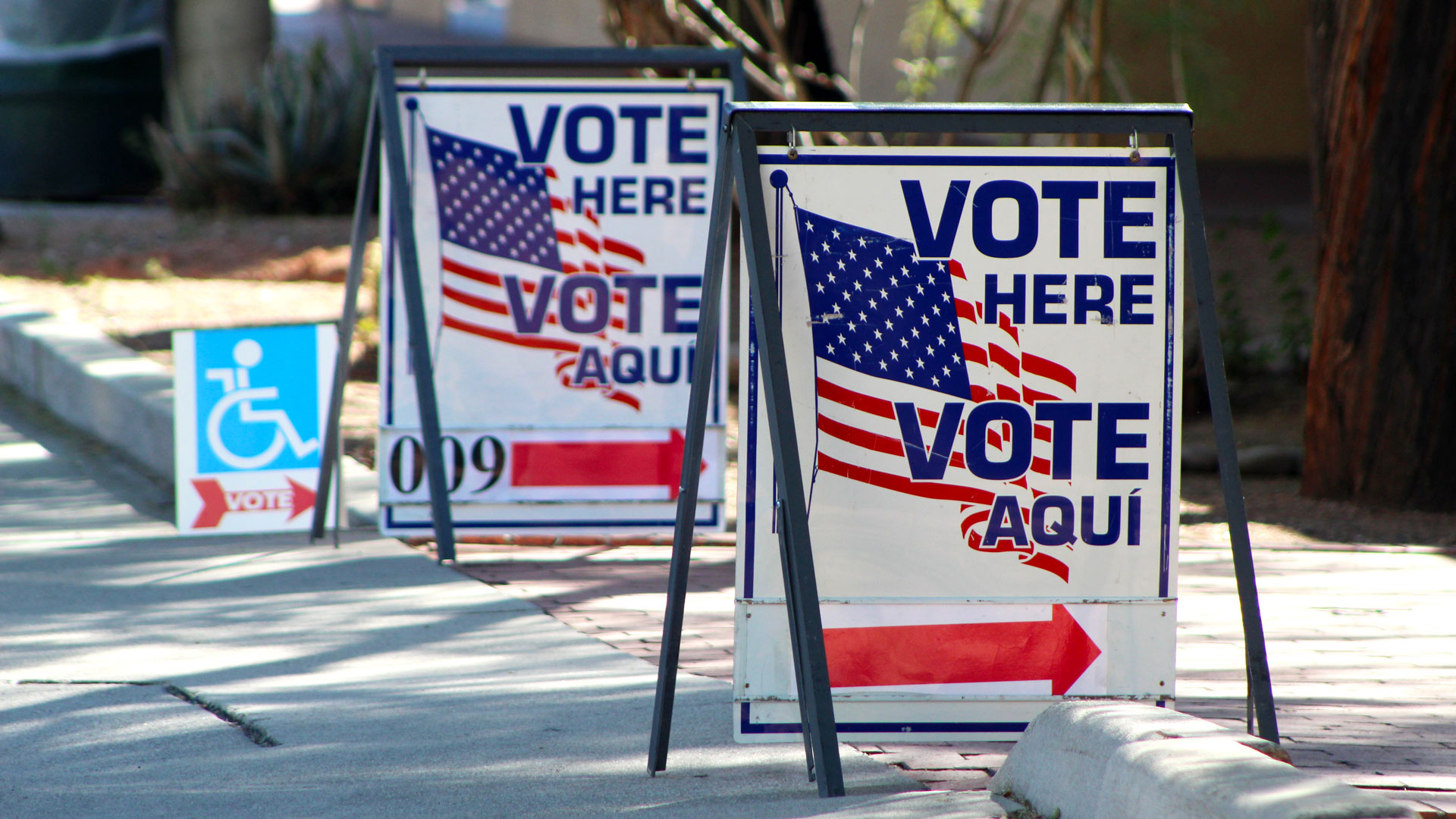 Two "Vote Here" signs sit outside the Armory Park Center on Tuesday, Nov. 8, 2022 in downtown Tucson.
Two "Vote Here" signs sit outside the Armory Park Center on Tuesday, Nov. 8, 2022 in downtown Tucson.
A federal judge is upholding provisions of new Arizona laws that would require counties to verify the status of registered voters who haven’t provided proof of U.S. citizenship and cross-check voter registration information with various government databases.
In a ruling Thursday, U.S. District Judge Susan Bolton concluded Arizona legislators did not discriminate when they adopted the laws and the state does have an interest in preventing voter fraud and limiting voting to those individuals eligible to vote.
“Considering the evidence as a whole, the court concludes that Arizona’s interests in preventing non-citizens from voting and promoting public confidence in Arizona’s elections outweighs the limited burden voters might encounter when required to provide (documentary proof of citizenship),” she wrote.
However, Bolton said the requirement for individuals using a state registration form to include their state or country of birth violates a provision of the Civil Rights Act and a section of the National Voter Registration Act. Doing so, she explained, would result in the investigation of only naturalized citizens based on county recorders’ subjective beliefs that a naturalized individual is a non-citizen.
The lengthy ruling summarizes testimony from a bench trial in late 2023 at which experts testified about Arizona's history of voting discrimination. That included literacy tests effectively precluding Native American and Latino voters from participating and voter roll purges in the 1970s and 80s that created barriers for minorities to re-register to vote.
That was the past, the judge wrote, noting there was no evidence presented by the plaintiffs reflecting an intent by lawmakers to suppress voter registrations of members of minority groups or naturalized citizens when they considered the bills in 2022.
The laws were passed amid a wave of proposals that Republicans introduced in the wake of Joe Biden’s 2020 victory in Arizona over Donald Trump.
In an earlier ruling, Bolton blocked a requirement in Arizona law that people who use a federal voter registration form provide additional proof of citizenship if they want to vote for president or use the state’s vote-by-mail system. The judge had ruled those provisions were trumped by a 1993 federal voter registration law.
She also had ruled that a 2018 consent decree prevents Arizona from enforcing its new requirement to reject any state voter registration forms that aren’t accompanied by proof of citizenship. The decree said Arizona may not reject an otherwise valid state voter registration form without proof of citizenship but rather must register such an applicant for federal elections.
Arizona is required to accept the federal registration form, but anyone who does not provide proof of citizenship is only allowed to vote for president, the U.S. House or Senate. The federal form requires people to swear they are U.S. citizens, but there is no proof requirement.
Federal-only voters have been a subject of political wrangling since the U.S. Supreme Court ruled in 2013 that Arizona cannot require documentary proof of citizenship for people to vote in national elections. The state responded by creating two classes of voters: those who can vote in all races and those who can vote only in federal elections.
After being approved on party-line votes, then-Republican Gov. Doug Ducey signed the measures into law.
“Election integrity means counting every lawful vote and prohibiting any attempt to illegally cast a vote,” Ducey wrote in a March 2022 letter when approving one of the proposals.
The laws were challenged by voting rights groups and the U.S. Department of Justice. They argued the new rules would make registering voters more difficult. Some also suggested the statutes were an attempt to get the issue back in front of a more conservative Supreme Court.
While supporters said the measures would affect only voters who have not shown proof of citizenship, voting advocates claimed hundreds of thousands of people who haven’t recently updated their voter registration or driver’s license could be affected.
The ruling states that Arizona has required documentary proof of citizenship since 2005, and the new laws supplement that requirement to ensure non-citizens do not register to vote or remain on the voter rolls.
One of the two measures examined by Bolton would require state election officials to cross-check registration information with various government databases to try to prove their citizenship and report anyone they can’t find to prosecutors.
“The court finds that though it may occur, non-citizens voting in Arizona is quite rare, and non-citizen voter fraud in Arizona is rarer still,” the ruling states. “But while the voting laws are not likely to meaningfully reduce possible non-citizen voting in Arizona, they could help to prevent non-citizens from registering or voting.”

By submitting your comments, you hereby give AZPM the right to post your comments and potentially use them in any other form of media operated by this institution.